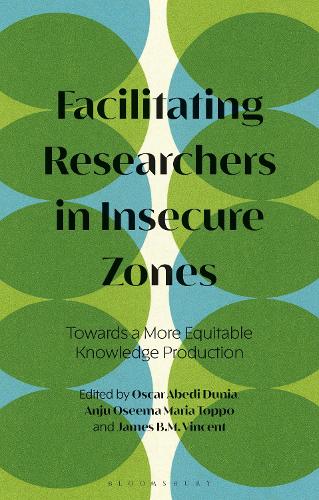
Facilitating Researchers in Insecure Zones: Towards a More Equitable Knowledge Production
(Hardback)
Available Formats
Publishing Details
Facilitating Researchers in Insecure Zones: Towards a More Equitable Knowledge Production
By (Author) Oscar Abedi Dunia
Edited by Anju Oseema Maria Toppo
Edited by James B.M. Vincent
Bloomsbury Publishing PLC
Bloomsbury Academic
19th October 2023
United Kingdom
Classifications
Tertiary Education
Non Fiction
Development studies
Ethics and moral philosophy
300.72
Physical Properties
Hardback
208
Width 138mm, Height 216mm
Description
This volume brings together accounts from facilitating or 'brokering' researchers in three settings afflicted by armed conflict, including DR Congo, Sierra Leone and Jharkhand, India. Indispensable to the research practice carried out by so-called 'contracting researchers', who are often based in the Global North, it is these facilitating researchers who truly regulate the access and flow of knowledge, and yet are often referred to merely as 'fixers', with their contributions systematically erased in the final research texts. This book recounts first-hand the varied and crucial roles played by such researchers, meanwhile bearing witness to the insecurities and scarce resources navigated by them in order to facilitate the research of others. By listening to and learning from their experiences, the book outlines different routes towards a more equitable fieldwork, and a more collaborative process of knowledge production.
Reviews
Facilitating Researchers in Insecure Zones is a compelling and innovative book that highlights the unequal relationship between Contracting Researchers and Facilitating Researchers engaging in research in conflict-affected countries. Examples from experiences in Sierra Leone, India and DR Congo are used to discuss the types of inequalities in the research process, from the conceptualization of the research to the publication of the research findings and analysis, including the funding of the research. It is an invaluable resource for researchers to establish a good and equal relationship prior to future research endeavors. * Gameela Samarasinghe, University of Colombo, Sri Lanka *
Author Bio
Oscar Abedi Dunia is an independent researcher and President of the NGO Aide Rapide aux victimes des catastrophes et Recherche (ARCV), based in South Kivu, DR Congo. He has worked with researchers from Europe and the US, as well as with journalists, the UN mission, and various international humanitarian organizations. Anju Oseema Maria Toppo is Assistant Professor in the Department of History, St. Xaviers College, Ranchi, in Jharkhand, India. She is also active in the social and resistance movements of the Adivasi (indigenous) population of Jharkhand. James B.M. Vincent is a researcher and consultant on governance, development and conflict-related issues, youth development and employment creation programmes, and agriculture in Sierra Leone and the Mano River region. Maria Eriksson Baaz is Professor in Political Science at the Department of Government, Uppsala University, Sweden. Swati Parashar is Associate Professor in Peace and Development at the School of Global Studies, Gothenburg University, Sweden. Mats Utas is Professor in Cultural Anthropology at Uppsala University, Sweden.
